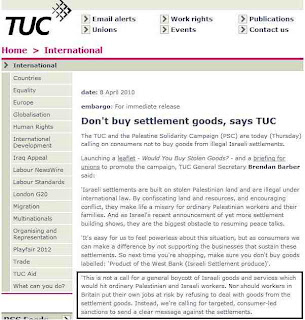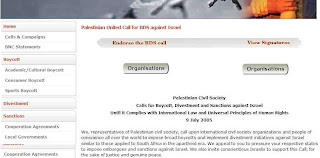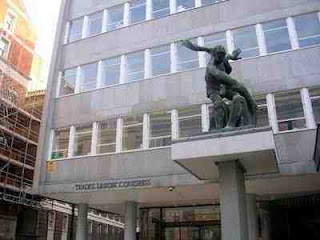


 Last September the Trades Union Conference passed policy in support of the Boycott of Israeli Goods.
Last September the Trades Union Conference passed policy in support of the Boycott of Israeli Goods.
At least that is what PSC Executive argued had happened. In fact the TUC had voted for a policy of boycotting Israeli settlement goods not a boycott of Israel’s economy. A more radical Fire Brigades Union motion, which called on the TUC ‘to develop an effective Boycott, Disinvestment and Sanctions campaign by working closely with the PSC’ was undermined by a statement from the TUC’s General Council which only supported a boycott of settlement goods ‘where trade union members should not put their own jobs at risk by refusing to deal with such products’.
Statements from the General Council take precedence over successful motions that unions have put forward. That is how the TUC undermines any radical and effective motions or policy (not that it passes a lot anyway!). It was, of course, understandable that PSC Executive and its trade union officer, Bernard Regan, should want to talk up their achievements. Even if this meant at times that PSC AGM could have been forgiven for believing that the TUC had come out in favour of a unitary, secular and democratic state!
Having no other achievements worthy of the name, PSC Executive talked this achievement up out of all proportion. The mouse had become a mountain. Unfortunately reality sooner or later set in as all that emerged was a joint PSC-TUC postcard campaign which, if past experience is anything to go by, will result in most of said material taking up permanent residence in the PSC basement.
In launching their campaign with the TUC for the boycott of settlement goods, PSC and the TUC issued a joint press statement (below) Much of the statement is unremarkable as most people would support a boycott of goods produced on stolen land. However what makes the statement unacceptable is that it also makes it clear that it is explicitly opposed to any general boycott of the Israel economy.
This is a flagrant and direct attack on the call by PACBI (Palestinian Academic & Cultural Boycott of Israel) and the BNC (Boycott Divestment & Sanctions National Committee) and dozens of Palestinian grassroots organisations to Boycott all Israeli institutions – economic, cultural and academic.
The BNC in a statement on its home page makes clear that:
‘The Palestinian Campaign for the Academic and Cultural Boycott of Israel was launched in Ramallah in April 2004 by a group of Palestinian academics and intellectuals to join the growing international boycott movement. The Campaign built on the Palestinian call for a comprehensive economic, cultural and academic boycott of Israel issued in August 2002 and a statement made by Palestinian academics and intellectuals in the occupied territories and in the Diaspora calling for a boycott of Israeli academic institutions in October 2003.’
The statement that PSC has put its name to explicitly opposes a wider boycott of Israeli goods.
‘’This is not a call for a general boycott of Israeli goods and services which would hit ordinary Palestinian and Israeli workers. Nor should workers in Britain put their own jobs at risk by refusing to deal with goods from the settlement goods. Instead, we’re calling for targeted, consumer-led sanctions to send a clear message against the settlements.’
There was absolutely no reason for PSC to put its name to this statement. It could have quite easily refused on the grounds that nowhere did the TUC state that a Boycott hurt Palestinian workers.
The TUC Congress by endorsing the TUC General Council statement supporting a Boycott of settlement goods had not opposed a more general boycott. It had left it to individual unions. Indeed, given that the FBU motion did include a call for a wider boycott, it could be argued that the TUC Congress, in the absence of a motion to the contrary, had actually endorsed a wider boycott.
Unions such as my own (UNISON) and UNITE have already passed wider motions of support for the Boycott campaign (whilst doing little about them). Instead the TUC has issued a call, with PSC Executive’s agreement, to actually oppose a wider boycott.
And they have done it using exactly the same arguments as Thatcher and Reagan used when opposing sanctions on South Africa.
Thatcher’s argument was that sanctions against Apartheid would hurt Black South Africans. No one bar supporters of Apartheid gave this any credence. PSC by adding its name to a statement which says that a general boycott of Israeli goods, cultural, academic and sporting organisations, ‘would hit ordinary Palestinian and Israeli workers.’ is scabbing on the Palestinians, who have made it clear that because they are already suffering so much from Israel’s apartheid policies, the added sacrifice on their part is worth it in order to improve the situation of Palestinians as a whole.
It is understandable that a New Labour apparatchik like Brendan Barber supports Israel and opposes a Boycott. This is a man who has never ever worked other than in TUC headquarters. The only thing he has ever fought for is a good place at a restaurant. But why did PSC Executive think it was necessary to give in to his demands?
No one doubts that Israeli workers would be hurt by such a boycott. That is the idea! Since Israel workers are complicit in the oppression of the Palestinians, indeed they are the most racist element of Israeli society, to refuse to penalise them would enable them to continue to attack Palestinian workers (e.g. taking jobs off Palestinians in times of recession).
The reason why a Boycott of Israel is absolutely vital, and why it is gaining increasing support, is because the settlements would not exist but for the occupation by the Israeli state. To oppose a boycott of Israel per se means that no pressure whatsoever is being exerted on the occupying power. Additionally, Israel had made it clear that it is quite happy for settlement industries and produce to be marketed as coming from Israel rather than the Occupied Territories, so any such boycott call will be ineffectual even in terms of settlement industry.
This is the logic of PSC’s 2 States position. 2 States means that one has nothing to say about Israel. It means accepting the existence of a Jewish and a colonialist state as it is now. It means running up the white flag of surrender just at the very time the Boycott campaign is meeting with increasing success.
This is the direct consequence of PSC AGM giving the Socialist Action/Communist League Executive of PSC a blank cheque. They have used this in order to undermine the whole Boycott campaign. Although it hasn’t been reported to PSC membership (like much else) 4 out of the 5 members of PSC’s own Boycott Committee have resigned. This was because of the control freakery of an Executive determined to tightly control their activities. In essence PSC has no Boycott campaign now worthy of the name.
Brendan Barber, TUC General Secretary, has always been hostile to the idea of Boycott. Three years ago at a PSC fringe meeting at TUC Congress, he hotfooted it from the Trade Union Friends of Israel meeting to tell PSC that he opposed any Boycott and that PSC should explicitly support a 2 State solution. At one point I interrupted him and asked how else, in that case, would he suggest applying pressure to Israel to change its behaviour? His answer? After recovering from the shock of being interrupted, was to continue reading from his script. He simply had no answer and today neither does PSC Executive.
This is also the logical consequence of the position Bernard Regan and his unelected Trade Union Action Committee adopted at PSC AGM where they effectively voted not to call for breaking links with Histadrut because, as Regan explained, the Histadrut is a changed animal.
What is the solution?
With the formation of the Boycott Israel Network (BIN) and the successful conference at Coalbrookdale 2 weeks ago followed by the disruption of the Jerusalem Quartet concert on March 29th and last week the acquittal of all 5 members of Scottish PSC who had also disrupted a Jerusalem Quartet concert, the BDS campaign was clearly making ground in Britain. That is still the case but it is a campaign which must now also face the fact that PSC has now committed itself to opposing a boycott of Israel.
There is no easy answer to what to do now. But if PSC is not to be written off entirely then it is even more essential to remove PSC Executive, none of whom are activists (at the weekend’s large Veolia demonstration there wasn’t a single PSC Executive member present). Although this hasn’t been discussed in BIN yet, there is no alternative but to try and call an Emergency General Meeting of PSC to no confidence the Executive and elect a leadership committed to solidarity with the Palestinians.
Tony Greenstein
date: 8 April 2010
embargo: For immediate release
Don’t buy settlement goods, says TUC
The TUC and the Palestine Solidarity Campaign (PSC) are today (Thursday) calling on consumers not to buy goods from illegal Israeli settlements.
Launching a leaflet – Would You Buy Stolen Goods? – and a briefing for unions to promote the campaign, TUC General Secretary Brendan Barber said:
‘Israeli settlements are built on stolen Palestinian land and are illegal under international law. By confiscating land and resources, and encouraging conflict, they make life a misery for ordinary Palestinian workers and their families. And as Israel’s recent announcement of yet more settlement building shows, they are the biggest obstacle to resuming peace talks.
‘It’s easy for us to feel powerless about this situation, but as consumers we can make a difference by not supporting the businesses that sustain these settlements. So next time you’re shopping, make sure you don’t buy goods labelled: ‘Product of the West Bank (Israeli Settlement produce)’.
‘This is not a call for a general boycott of Israeli goods and services which would hit ordinary Palestinian and Israeli workers. Nor should workers in Britain put their own jobs at risk by refusing to deal with goods from the settlement goods. Instead, we’re calling for targeted, consumer-led sanctions to send a clear message against the settlements.
‘And with the Palestine Solidarity Campaign we’re also calling on the UK Government to make sure that the EU bans the sale of these goods.’
NOTES TO EDITORS:
– Would You Buy Stolen Goods? is available at www.tuc.org.uk/extras/settlementgoodsleaflet.pdf and the briefing for trade union officers is available at www.tuc.org.uk/extras/settlementsbriefing.pdf
– For more information on the TUC policy on the Middle East go to www.tuc.org.uk/congress/tuc-16991-f0.cfm